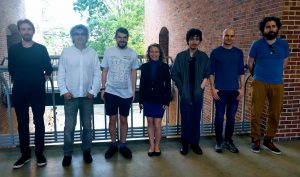FACULTY
Dana Bartosova, Douglas Cenzer (retired), Jean Larson (Emeritus), Robin Tucker-Drob, William Mitchell (Emeritus), Jindrich Zapletal
CURRENT STUDENTS
Jacob Kowalczyk, Cayley Robinson, Justin Young
FORMER STUDENTS
Francis Adams,Hector Andrade, Katie Brodhead, Omar De la Cruz Cabrera ,Ali Dashti, Michal Doucha, Cameron Fraize, John Hester, Richard Krogman, Mike Jamieson, Jeffrey Leaning, Bill Moser, John People, Diego Rojas Rebolledo, Farzan Riazati, Yuan-Chuan Sheu, Ferit Toska, Zia Uddin, Amy Vanderbilt, Lauren Wickman, Thomas Winckler, Sebastian Wyman, Yuxin Zhou
ACTIVITIES
We run a weekly seminar, Logic Seminar. Every year, in the beginning of March, we organize the South-Eastern Logic Symposium, a weekend conference, funded by NSF. The websites from past years: 2018, 2020, 2021, 2022, 2023.
RESEARCH
The logic and set theory group at UF focuses on contemporary research in a broad range of mathematics with important inter and intra-discipline connections. Below is a brief synopsis of the activities. For more information, follow the links above to visit individual faculty and the logic seminar web site.
Choiceless set theory. Choiceless set theory studies various consequences of the axiom of choice in the areas of analysis, algebra etc. and asks whether they imply one another on the basis of ZF set theory without the axiom of choice. The result is a deep stratification of the areas concerned. We discovered a new and productive methodology for obtaining independence results in ZF set theory parallel to the amalgamation techniques in model theory and combinatorics.
Combinatorial set theory. As Walter Deuber said, “complete disorder is impossible”. Combinatorial set theory searches out swaths of uniform behavior, especially in various types of partition relations, of the cardinals, ordinals, linear orders, and partial orders that underpin many transfinite arguments.
Descriptive set theory. Descriptive set theory is the study of definability of various sets of real numbers. It turns out that we can infer many properties of such a set just from the syntax of its definition. One famous tool of this theory is the determinacy of infinite games, stating that one player must necessarily have a winning strategy in a certain type of two-player game of infinite duration. One popular application of this theory is the rating of many key problems in pure mathematics according to their complexity.
Forcing with ideals. Shelah’s powerful method of proper forcing, used for decades for independence results regarding the structure of the real line can be sharpened quite a bit under the assumption that the forcing is in a certain sense definable. This leads to the study of various σ-ideals on Polish spaces and the quotient algebras of Borel sets modulo the ideal. The forcing properties of the quotient are closely connected with the analytic and descriptive properties of the ideal, providing a strong link between proper forcing and such fields as descriptive set theory, measure theory, dynamical systems and Ramsey theory.
